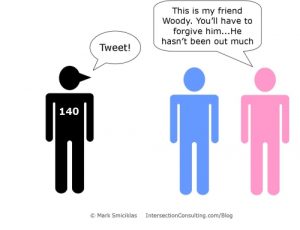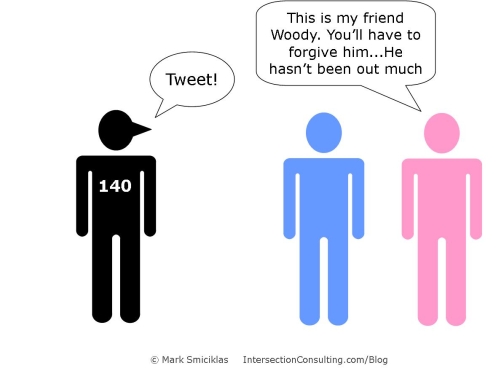Search for “social media marketing” on Google (or Bing) and you’ll likely end up in a black hole of Twitter guides, bit.ly retweets, social media “mavens” and Top 7 Tips for Creating a Facebook Fanpage blog posts. And it’s no wonder everyone sees the need to discuss and “explain” how social media works for the 270 billionth time. With so much discussion on the topic, you need to be a social media expert just to navigate it all.
 Yet, one social media topic manages to slip through the cracks. And it’s often the first obstacle companies encounter when they decide “social media” is the answer to all of their problems:
Yet, one social media topic manages to slip through the cracks. And it’s often the first obstacle companies encounter when they decide “social media” is the answer to all of their problems:
Who’s going to carry out all of these social media initiatives?
It’s the Human Factor – who is going to create the content for that blog? Who is going to reply to all those tweets? Who is going to make sure your Facebook page doesn’t turn into a hate fest? In fact, who decides if you should have a Facebook page at all?
If you’re like many companies, you might think outsourcing social marketing is your best bet.
But more than ever companies are working to keep social media in-house because it requires such an intimate knowledge of the brand and because of the personal nature of social media interactions in general. Customers want to talk to you, not an “outsourced” spammy twitter account. And when you leave them with no choice, they happily take their discussion to your nearest competitor.
Based on the MarketingSherpa Social Media Marketing Benchmark Survey of more than 2,300 respondents in November of 2009, social marketing responsibilities are outsourced less often than traditional marketing responsibilities– meaning you’re more than likely going to need to look internally to find your resources for a social marketing team.
And here’s where I believe many companies get it wrong. Instead of hiring or tasking the best person for the job, whether that’s managing the Twitter account or actively engaging in forum discussions, many companies put their least experienced, least qualified people on an overwhelming number of social media initiatives. Usually this person is in marketing and may be tasked to cover topics or areas of social media they have little or no experience in. But this isn’t the most efficient and certainly not the most effective method for achieving social media success.
But how do you go about identifying who in your organization is best suited to carry out social media objectives? The answer is surprisingly simple. You pick the right person for the job.
For example, don’t send your marketing team to engage users in a developer forum. They’ll stand out like a script kiddie at a Def Con Conference. Instead, encourage your developers to actively engage users in forums related to their industry. Task these same developers to contribute technical content to the company blog. It’s surprising the level of involvement you’ll get from your team when you place a little responsibility in their hands.
Customer service can provide you with your Twitter recruits. In many ways they are trained for the role, just in a different medium. And your Sales department is a great place to find outgoing personalities to run the company Facebook page or handle group discussions on LinkedIn.
The point is that your social media team should be composed of individuals from various departments who can each provide a certain level of expertise by contributing just a few hours a week to social marketing initiatives each week.
To learn more about how you can keep your employees accountable for social media initiatives, check out the new MarketingSherpa Social Marketing Handbook.
Related Resources
The MarketingExperiments Quarterly Research Journal
MarketingSherpa Social Marketing Training
Photo Credit: Intersection Consulting




For an example of an organization that successfully divides the social media workload (without dumping things on an intern), see my interview with the head of marketing at the Durham Bulls baseball team in North Carolina: http://karlsakas.com/durham-bulls-interview-with-matt-demargel/
The marketing director does Facebook and website updates. Their multimedia director does YouTube updates, since he’s already working with video every day. And the team’s General Manager makes Twitter updates himself — like a corporate CEO, he’s the personality that fans want to hear from. They meet once a month to coordinate strategy.
Thanks for the great post, Nathan. Coincidently, just before reading your article, I wrote the following in a training program slide titled, “Where to find candidates for your social marketing team”:
* Bad news: You will more than likely have to build your team internally from existing resources.
* Good news: You will find qualified and enthusiastic candidates everywhere!
Kind of sums up your article!
-Sergio
(For disclosure, I’m Research Direstor at MarketingSherpa and lead author of the publications mentioned in this article.)
This is a key factor when selling your social media marketing product to clients. Who will handle activity like this on a consistent basis (not just for one off contests).
Clients generally don’t want to be involved in it, because it eats up resources they don’t have – and they also don’t want to pay for it because it eats up $$ they don’t have or don’t want to spend.
Great article! Businesses tend to assign their entire social media marketing campaign to one person. But a more authentic message can be conveyed to new and current customers when they get to hear from other voices within the company such as the project manager, designers, and sales team. I definitely put the knowledge and resources of my co-workers to use on our company blog and every week we have fresh ideas from a different perspective.
marketing is science + art. and for social media marketing the “art” part becomes more important.you don’t want a outsider who speaks entirely different language that your customers will never understand to sabotage your marketing science